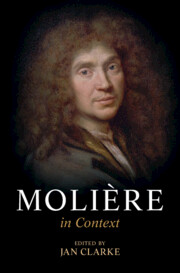Book contents
- Molière in Context
- Molière in Context
- Copyright page
- Dedication
- Contents
- Figures
- Charts and Tables
- Contributors
- Acknowledgements
- Translations
- Abbreviations
- Biographical Preface
- Part I Socio-Political Context
- Part II Intellectual and Artistic Context
- Part III Theatrical Context (Paris)
- Chapter 13 Molière’s Theatres in Paris
- Chapter 14 Stage Design in Paris
- Chapter 15 Company Administration
- Chapter 16 The Theatre Industry and Cultures of Consumption
- Chapter 17 Acting Style
- Part IV Theatrical Context (Court)
- Part V Reception and Dissemination
- Part VI Afterlives
- Further Reading
- Index
Chapter 16 - The Theatre Industry and Cultures of Consumption
from Part III - Theatrical Context (Paris)
Published online by Cambridge University Press: 10 November 2022
- Molière in Context
- Molière in Context
- Copyright page
- Dedication
- Contents
- Figures
- Charts and Tables
- Contributors
- Acknowledgements
- Translations
- Abbreviations
- Biographical Preface
- Part I Socio-Political Context
- Part II Intellectual and Artistic Context
- Part III Theatrical Context (Paris)
- Chapter 13 Molière’s Theatres in Paris
- Chapter 14 Stage Design in Paris
- Chapter 15 Company Administration
- Chapter 16 The Theatre Industry and Cultures of Consumption
- Chapter 17 Acting Style
- Part IV Theatrical Context (Court)
- Part V Reception and Dissemination
- Part VI Afterlives
- Further Reading
- Index
Summary
Although the theatre industry developed mainly from the nineteenth century onwards, Parisian theatres in Molière’s time already had some aspects of modern commercial entertainment – developing strategies to generate additional income and revenue through private performances, for example. This chapter examines how companies competed to position themselves as leaders in the Parisian market. It assesses the seasonal programming and level of success of the plays that were performed, examining the knock-on effect of increased competition on the Hôtel de Bourgogne in the 1660s, and shows the spending and investment choices of Molière’s troupe. As a commercial enterprise, the troupe aimed to attract Parisian audiences while continuing to please the court. It paid, therefore, particular attention to its facilities and services in the capital, and travelled outside Paris to participate in court festivities. The company had to juggle its duty to the King, for whom sumptuous and expensive entertainments were a means of showing his power and influencing other European courts, and to its bourgeois Parisian clients, who provided it with a regular income and could not, therefore, be neglected. In this respect Molière proved to be a wise man, becoming a wealthy entrepreneur of spectacles.
- Type
- Chapter
- Information
- Molière in Context , pp. 154 - 161Publisher: Cambridge University PressPrint publication year: 2022

